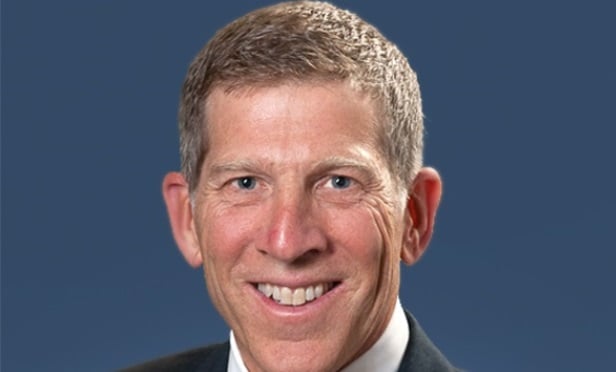BASKING RIDGE, NJ—Verizon Communications' record-breaking $650 million sale-leaseback of its operations center in Basking Ridge, NJ is “not too shabby a transaction,” says the dean of the Edward J. Bloustein School of Planning and Public Policy at Rutgers University in New Brunswick.
“Verizon purchased the building from Pfizer in 2005 for just under $100 a square foot,” says Dr. James W. Hughes of the Bloustein School. Hughes is a demographer who has done extensive research on New Jersey's suburban office markets. “Even though they had to do substantial renovations, a $464 [per square foot] sales price 10 years later looks pretty good.”
As reported by GlobeSt.com yesterday, in the largest sale-leaseback transaction ever completed in suburban New Jersey, Cushman & Wakefield arranged a $650.3 million transaction for the 1.4 million square foot Verizon operations center at 1 Verizon Way in Basking Ridge, NJ.
The transaction underscores a broad and continuing trend among large companies with office real estate accumulated over decades that need less space and turn to sale-leaseback transactions to unlock the value of that property.
"Companies with large headquarters buildings will continue to evaluate sake leasebacks or mortgage financing with guaranteed leases as ways to extract value from otherwise locked asset value," says Peter Reinhart, director of Monmouth University's Kislak Real Estate Institute. "I don't think the Verizon transaction will trigger others as this is a tool that companies are already well aware of. Individual situations dictate whether sale leaseback is right for them. However, the sale price might cause other companies to take a fresh look at this option again."
Cushman & Wakefield's Michael Rotchford, executive vice president and head of corporate finance and investment banking for the firm, tells GlobeSt.com exclusively that he divides his analysis of potential sale-leaseback opportunities into two groups, nonstrategic corporate campuses and strategic ones.
“With respect to nonstrategic corporate campuses, a lot of our clients have looked at what's the best way to exit those over a period of time, to the extent that they are going to relocate within the community or outside the community,” Rotchford says. “Those clients take a look at a number of different factors like what impact it has on the existing workforce and the future workforce. They also look at what sort of collaborative environment can be created.”
Some clients end up in a hybrid situation where they downsize space and sell off the excess, he says. “It's really situation-specific,” he says.
Rotchford declined to discuss the Verizon property specifically, but he says mission-critical properties like operations centers or technology centers are often the last assets that companies evaluate for these kinds of transactions, and frequently don't involve relocation of the people who work there.
“You can't look at these decisions solely in the context of 'What is the real estate cost to me?'” he says. “If a company has invested a significant amount of dollars in R&D space and the area has the appropriate scientific and engineering pool to pull from, it may be better to stay in place than make a pure real estate decision, where just on the real estate costs it might be cheaper to relocate to Texas.”
Verizon, while declining to make its real estate team available to discuss the transaction, says it's just taking advantage of market conditions.
“What we're doing here is simply taking advantage of historically low rates to extract the maximum value out of this real estate asset while still occupying it,” Raymond McConville of Verizon's media relations team tells GlobeSt.com exclusively. “It's a common trend in corporate real estate, and that's because you get a much lower residual value out of a property after it has been vacated. But in summary, the market rates are good, and we've always leveraged our high-value real estate assets when we can get such strong value for them.”
The facility, which employs approximately 3,900 full-time employees, was acquired by Mesirow Realty Sale-Leaseback, Inc., a division of Mesirow Financial, a diversified financial services firm headquartered in Chicago.
Verizon also is quick to point out that it's not packing its bags any time soon.
“This doesn't change our commitment to the region and our presence in New Jersey,” McConville says. “We've leased back 100 percent of the property for a 20-year term, so we plan on being in the area for a long time.” The campus houses a full range of businesses within Verizon Communications and also serves as headquarters for Verizon's wireless unit.
Monmouth's Reinhart is not so sure, however. "The reported twenty year lease backed by a very high quality credit tenant seems to justify the higher value," he says. "It will be interesting to see whether Verizon will occupy the entire space for the full lease term or at some point seek to find other tenants for part or all of the space."
Led by Rotchford, the Cushman & Wakefield investment banking team included David Wenk, Robert Elms and Mark Todrys. They worked in conjunction with both Kuriloff and with David Bernhaut, vice chairman of the Cushman & Wakefield capital markets group in New Jersey.
After acquiring the property in 2005, Verizon made a significant investment undertaking an extensive upgrade to create a world-class headquarters.The building earned LEED Silver certification from the US Green Building Council in December 2009.
© 2024 ALM Global, LLC, All Rights Reserved. Request academic re-use from www.copyright.com. All other uses, submit a request to [email protected]. For more information visit Asset & Logo Licensing.








